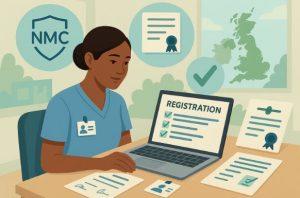The Nursing and Midwifery Council (NMC) in the United Kingdom plays an essential role in safeguarding public health by regulating nurses and midwives. As the central regulatory body, it ensures that these professionals adhere to the highest standards of care, conduct, and competence.
The NMC’s work not only shapes the standard of healthcare delivery but also strengthens public confidence in nursing and midwifery services.This article explores the NMC’s responsibilities, standards, and the processes that define its governance model.
What Is the Nursing and Midwifery Council UK (NMC)?

Serving across all four UK nations, the NMC acts as the official regulatory authority for both nursing and midwifery professionals. It was established by the Nursing and Midwifery Order 2001 and functions independently, funded primarily by registration fees.
Legal Authority and Mission
Legally empowered through government legislation, the NMC holds the responsibility to establish training benchmarks, oversee the nursing and midwifery register, and ensure adherence to professional requirements. Its mission is clear: to promote high standards of education, training, and conduct in nursing and midwifery, thereby ensuring public safety.
Regulatory Reach
From student midwives in London to experienced nurses across the UK, every professional under the NMC’s purview must meet its criteria to practise. The Council’s decisions influence healthcare settings ranging from hospitals to community health centres.
What Are the Key Roles and Responsibilities of the NMC?
The NMC’s core responsibility is to ensure that individuals on its register are capable and safe to practise.
Maintaining the Professional Register
One of the NMC’s primary tasks is to maintain an up-to-date and accurate register of all qualified nurses and midwives in the UK. This list confirms who is eligible to practise and assures the public of their qualifications.
Investigating Allegations
When a professional is suspected of misconduct or incompetence, the NMC investigates. If necessary, the Council may take disciplinary action, which can include suspension or removal from the register.
Setting Educational and Practice Standards
Educational courses in nursing and midwifery are required to align with the framework and quality criteria defined by the NMC. These guidelines ensure consistent, high-quality preparation for future healthcare workers.
How Does the NMC Ensure Standards in Nursing and Midwifery?
To uphold public trust, the NMC develops frameworks that guide practice and education.
Developing the Code
The NMC Code is a comprehensive guide covering professionalism, behaviour, and decision making. It applies to all nurses and midwives and reflects expectations around care, respect, and patient advocacy.
Monitoring Compliance
The Council regularly reviews institutions and professionals. This ensures that those in practice maintain the required level of competence and professionalism.
Professional Development
By encouraging lifelong learning and periodic review of skills, the NMC fosters a culture of continuous improvement.
Why Is Revalidation Important for Nurses and Midwives in the UK?

Revalidation is not just a formality. it is a vital mechanism for public protection.
A Structured Review Process
Revalidation occurs every three years and includes confirming practice hours, receiving feedback, engaging in professional development, and writing reflective accounts. These steps help ensure that a nurse or midwife remains current and competent.
Reinforcing Accountability
Revalidation isn’t merely administrative. It holds professionals accountable for upholding the values and standards set forth in the NMC Code.
Building Public Confidence
Revalidation enhances public confidence by demonstrating that practitioners are committed to maintaining excellence.
What Is the NMC Code and Why Does It Matter?
The Code developed by the NMC acts as the foundational guide for ethical and effective professional conduct in UK nursing and midwifery.
Four Key Themes
- Prioritise People: Respect, compassion, and patient-centred care
- Practise Effectively: Evidence-based, competent care
- Preserve Safety: Recognise and act on risks
- Promote Professionalism and Trust: Uphold the reputation of the profession
Practical Application
Every healthcare decision, whether clinical or ethical, is expected to align with these principles. Failure to follow the NMC’s Code may lead to official investigations and potential disciplinary proceedings.
How Does the NMC Protect the Public and Promote Trust?
Public trust is the foundation of any healthcare system, and the NMC actively works to preserve it.
Fitness to Practise Proceedings
If concerns arise about a nurse or midwife’s ability to practise safely, the NMC may initiate fitness to practise hearings. These tribunals determine whether restrictions or removal from the register are necessary.
Handling Complaints
When concerns are raised by patients, co-workers, or healthcare employers, the NMC evaluates these reports in light of the Code to decide whether regulatory intervention is necessary.
Transparent Operations
The NMC publishes decisions and guidelines publicly, reinforcing trust through transparency.
What Is the Process of Registering with the NMC in the UK?

Whether trained in the UK or abroad, all nurses and midwives must register with the NMC to legally practise.
UK-Trained Professionals
Individuals who complete accredited nursing or midwifery education in the UK are eligible to submit an application for NMC registration.
They must confirm identity, character, and educational attainment.
International Applicants
Foreign-trained nurses undergo a more complex process that includes:
- Verification of qualifications
- English language proficiency (e.g., IELTS, OET)
- The NMC’s Test of Competence (CBT and OSCE)
UK vs. International NMC Registration
| Registration Step | UK-Trained Applicant | International Applicant |
| Qualification | UK-approved nursing or midwifery programme | NMC-recognised foreign qualification |
| English Language Requirement | Typically not required | IELTS or OET required |
| Identity & Health Check | Standard verification | Standard verification |
| Test of Competence | Not required | CBT (Computer Based Test) and OSCE (Clinical) |
| Fees | £120 registration fee | £140–£153 depending on test centre |
| Timeline | 4–6 weeks | 3–6 months depending on application completeness |
How Does the NMC Collaborate with Other Healthcare Regulators?
Effective regulation is rarely done in isolation. The NMC cooperates with multiple UK healthcare entities.
Working with the GMC and HCPC
The NMC liaises with the General Medical Council (GMC) and the Health and Care Professions Council (HCPC) to share data and insights.
Inter-Agency Public Protection
Joint operations ensure that problematic individuals do not slip through regulatory gaps.
What Are the Salary Differences for Nurses and Midwives in the UK?
Salary levels for nurses and midwives in the UK vary depending on experience, role, location, and the NHS pay bands. London-based healthcare professionals may also receive a High-Cost Area Supplement due to the capital’s living costs.
- Experience and Seniority: Newly qualified nurses start at lower bands, while experienced staff, ward managers, and advanced practitioners earn more.
- NHS Banding System: Pay is primarily determined by NHS Agenda for Change pay bands.
- Location: London and surrounding areas provide additional allowances.
- Specialisation: Midwives, community nurses, and specialist nurses can earn higher salaries depending on demand.
UK Nursing and Midwifery Salary Table (2025 Estimate)
| Role/Position | NHS Pay Band | Starting Salary (per year) | Experienced Salary (per year) | With London Allowance |
|---|---|---|---|---|
| Newly Qualified Nurse | Band 5 | £28,407 | £34,581 | +£4,000 approx. |
| Staff Midwife | Band 5 | £28,407 | £34,581 | +£4,000 approx. |
| Senior Nurse / Specialist Nurse | Band 6 | £35,392 | £42,618 | +£4,500 approx. |
| Senior Midwife / Team Leader | Band 6 | £35,392 | £42,618 | +£4,500 approx. |
| Ward Manager / Advanced Nurse | Band 7 | £43,742 | £50,056 | +£5,000 approx. |
| Consultant Midwife / Nurse | Band 8a | £51,489 | £57,802 | +£6,000 approx. |
Note: Figures are approximate for 2025 and include NHS roles. Private sector and agency work can vary significantly.
What Challenges and Future Developments Face the NMC?

As healthcare rapidly evolves, so must its regulatory bodies.
- Workforce Pressure: The NHS faces staffing shortages, and the NMC must streamline registration without compromising standards.
- Diversity and Inclusion: Efforts are underway to ensure that all professionals, regardless of background, are treated fairly throughout regulatory processes.
- Digital Transformation: The Council is investing in technology to improve registration services and case handling procedures.
Conclusion
The Nursing and Midwifery Council UK is more than a regulatory body. it’s a guardian of public health and professional integrity. Its responsibilities, from registration to revalidation, play a vital role in ensuring that nurses and midwives continue to deliver high-quality, compassionate care.
As the UK’s healthcare landscape changes, the NMC will undoubtedly adapt and evolve, but its core mission protecting the public will remain constant.
FAQs
How long does NMC registration take for overseas nurses?
On average, it takes between 3 to 6 months, depending on documentation, test results, and verification timelines.
Can you work in the NHS without being registered with the NMC?
Legally, any nurse or midwife who wishes to practise in the UK whether in the NHS or private sector must hold current registration with the NMC.
What is the NMC Code based on?
The Code is based on principles of ethical, safe, and effective care and aligns with UK healthcare values.
What happens during a fitness to practise hearing?
The NMC tribunal examines evidence, listens to both parties, and decides whether a professional should face sanctions or removal.
Does the NMC offer support for international nurses?
Yes, the NMC provides detailed guides and test preparation resources for international applicants.
How does the NMC ensure education standards are met?
It regularly inspects and audits UK education institutions offering nursing and midwifery programmes.
What role does the public play in NMC investigations?
Members of the public can submit complaints or evidence, which may be used during hearings or reviews.









Leave feedback about this